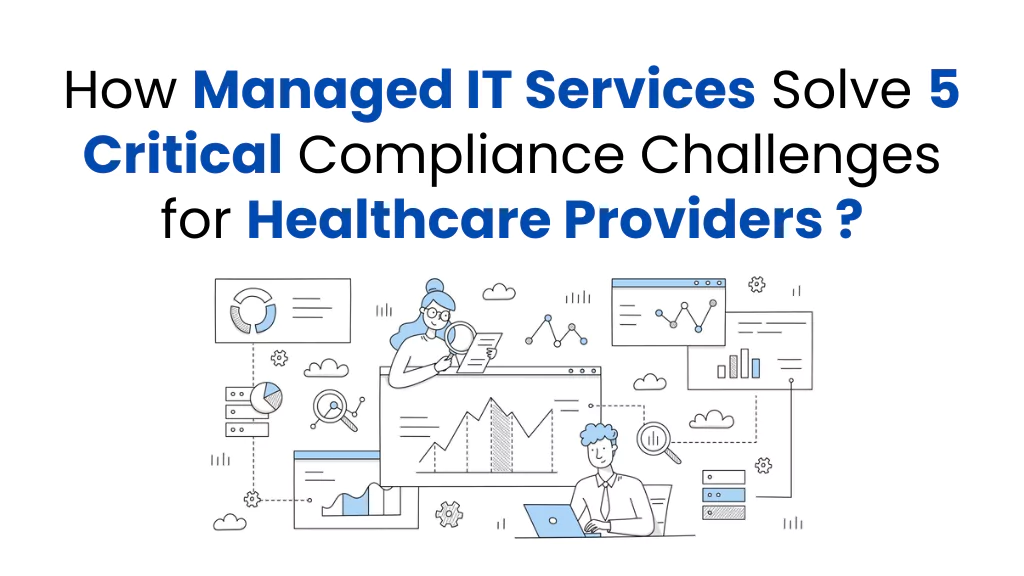
Key Points:
60% of healthcare breaches stem from non-compliance (HIPAA Journal).
Healthcare data breaches cost $10.93M on average (IBM, 2023).
Inadequate encryption exposes PHI to theft; MSPs use AES-256 + TLS 1.3 for HIPAA-compliant data protection.
Poor access controls lead to unauthorized PHI access; MSPs enforce RBAC + MFA.
Outdated software causes 80% of breaches (HHS); MSPs automate patching and EOL tracking.
Third-party vendors risk PHI leaks; MSPs ensure BAA compliance and vendor audits.
Audit failures leave gaps; MSPs provide real-time logs and mock drills for HIPAA readiness.
Healthcare data security is more important than ever. With evolving threats, healthcare organizations face a massive burden to maintain compliance with complex regulations like HIPAA compliance, GDPR, and local privacy laws. Healthcare information security failures often lead to data exposure, legal action, and loss of trust. Managed IT services for healthcare help maintain data protection in healthcare by offering scalable, proactive, and expert-level solutions. Cloud security healthcare has become a baseline requirement rather than an optional upgrade.
With 8+ years securing healthcare systems, we’ve seen compliance gaps first-hand. MSPs like us, understand the terrain. Here’s how managed IT services for healthcare can close the healthcare data security gaps.
5 Critical Compliance Challenges and How MSPs Solve Them
Challenge | Risk to Healthcare Data Security | MSP Solutions |
|---|---|---|
1. Inadequate Data Encryption | Lack of AES-256 and TLS 1.3 leaves PHI vulnerable to theft and interception. Average breach cost in healthcare: $10.93M (IBM Report). | • End-to-end encryption using AES-256 and TLS 1.3 • Encrypted backups (local & cloud) • Regular HIPAA encryption audits • Secure cloud infrastructure |
2. Poor Access Controls | Weak RBAC policies increase exposure risks to sensitive patient information. | • Role-Based Access Control (RBAC) • Multi-Factor Authentication (MFA) & biometrics • Continuous access monitoring • User-level access policy enforcement |
3. Outdated Software Vulnerabilities | Legacy systems leave healthcare organizations open to cyberattacks. 80% of breaches exploit unpatched software (HHS Report). | • Automated patch management • End-of-life (EOL) system tracking • Vulnerability scanning & updates • Adoption of modern cloud-native platforms |
4. Non-Compliant Third-Party Vendors | Vendor mismanagement can lead to HIPAA violations and data breaches. | • Third-party risk assessments • Vendor compliance monitoring • Standardized Business Associate Agreements (BAAs) • HIPAA-aligned vendor practices |
5. Audit Preparedness Failures | Lack of logs and compliance dashboards makes HIPAA audits difficult. | • Real-time log monitoring • Threat detection systems • Internal mock audits • Centralized compliance dashboards |
Why Healthcare Providers Trust Managed IT Service Provider
Feature | Managed IT Services | In-House IT |
|---|---|---|
Healthcare Data Security | AES-256 encryption, Multi-Factor Authentication (MFA), continuous security monitoring | Basic antivirus and firewall protections |
Data Protection in Healthcare | Encrypted cloud backups, disaster recovery (DR) plans | Manual backup routines with limited disaster recovery |
Healthcare Information Security | HIPAA compliance audits, automated breach alerts | Occasional internal reviews without automation |
Cloud Security Healthcare | Scalable and continuously monitored cloud infrastructure | Limited scalability, minimal cloud monitoring |
Audit Readiness | 24/7 compliance support, mock audit drills | Reactive response only after compliance issues |
“The value of an MSP lies in proactive defense. In-house teams often detect issues after the damage is done.” — John Reynolds, HIPAA Auditor
How to Choose the Right MSP for Compliance
Checklist: 5 Questions to Ask Your MSP
- Do your disaster recovery services follow HIPAA protocols?
- How do you secure Electronic Health Records (EHR)?
- Can you provide full audit reports on-demand?
- What are your encryption and cloud security healthcare standards?
- Do your engineers hold CISSP, HITRUST, or HIPAA certifications?
Conclusion
In 2024, healthcare compliance is no longer a checkbox exercise—it’s a strategic imperative. With breaches costing $10.93M on average and evolving regulations like HIPAA and GDPR, providers cannot afford gaps in healthcare data security. The five critical challenges—inadequate encryption, poor access controls, outdated software, third-party risks, and audit failures—demand more than reactive fixes. They require proactive, scalable solutions that only Managed IT Services (MSPs) can deliver.
By partnering with MSPs, healthcare organizations gain:
Military-grade encryption (AES-256, TLS 1.3) for PHI at rest and in transit.
Zero Trust frameworks with RBAC, MFA, and real-time monitoring.
Automated compliance (patches, BAAs, audit trails) to eliminate human error.
Future-proof cloud infrastructure that replaces legacy risks with agile, secure systems.
At Technokraftserve LLC, we bring 8+ years of proven expertise, HIPAA, CISSP, and ISO 27001 certifications, and a track record of securing 50+ healthcare providers globally. Our mission is simple: turn compliance from a burden into your strongest defense.
FAQs
MSPs implement AES-256 for stored data and TLS 1.3 for data in transit, aligning with HIPAA $164.312. Regular audits validate encryption protocols.
Role-Based Access Control (RBAC) limits PHI access to authorized personnel only, reducing insider threats and accidental leaks.
They automate patch management, track End-of-Life (EOL) software, and migrate systems to HIPAA-compliant cloud infrastructure.
Business Associate Agreements (BAAs) legally bind vendors to HIPAA rules, ensuring PHI protection across the supply chain.
They automate log collection, run mock HIPAA audits, and maintain real-time compliance dashboards to eliminate gaps.

Pingback: Choosing Your Compliance Sidekick: A Hilariously Helpful Guide for Healthcare – Technokraftserve LLC